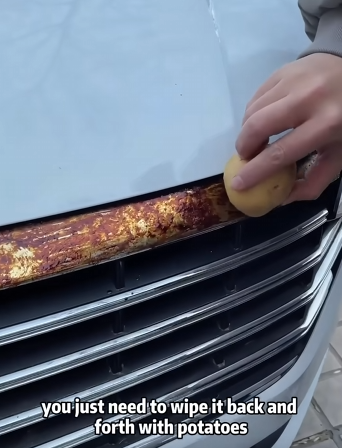
Potatoes, a humble staple in kitchens worldwide, have recently gained attention in an unexpected field: automobiles. While you might typically associate potatoes with mashed dishes, crispy fries, or creamy soups, these tubers are quietly contributing to the automotive industry in surprising ways. From eco-friendly biofuels to sustainable car parts, the magic power of potatoes in cars is transforming the way we think about both agriculture and technology. But how can a vegetable like a potato, often thought of as just a side dish, influence the future of transportation? Let’s delve into this fascinating connection.
1. Potatoes as Biofuel: A Green Revolution for Cars
One of the most exciting ways potatoes are making an impact in the automotive world is through the development of biofuels. Biofuels are renewable fuels derived from organic materials, and they are seen as an alternative to fossil fuels, which are a significant source of pollution and climate change. The most common biofuels, like ethanol, are typically derived from crops such as corn or sugarcane. However, potatoes are now being explored as an alternative source of bioethanol, a type of biofuel that can be used to power vehicles.
Potatoes are particularly well-suited for bioethanol production due to their high starch content. Starch is a complex carbohydrate that can be broken down into sugars, which are then fermented to produce ethanol. The process is relatively straightforward: potatoes are processed to extract their starch, which is then fermented and distilled into ethanol. This bioethanol can be blended with gasoline to reduce a car’s reliance on traditional fossil fuels.
Using potatoes for biofuels offers several environmental benefits. Unlike gasoline or diesel, bioethanol burns cleaner, producing fewer carbon emissions. Additionally, because potatoes are a renewable resource, the use of potato-based biofuels could reduce dependence on non-renewable oil reserves. The potential to grow potatoes specifically for biofuel production also creates new agricultural opportunities, especially for farmers in regions with suitable growing conditions.
While research into potato-based biofuels is still in its early stages, it holds promise as a sustainable solution for powering cars in the future.

2. Potatoes in Car Tires: Sustainable Materials
Potatoes aren’t just helping with fuel; they’re also making their way into the physical structure of cars. In recent years, researchers have explored using potato starch as a sustainable material for producing tires. The process involves extracting the starch from potatoes and using it to create a type of rubber that can be molded into tires.
Traditional tires are made from synthetic rubber, a petroleum-based product that contributes to environmental pollution. The production of synthetic rubber requires significant energy and resources, making it less sustainable in the long run. Potato-based rubber, however, offers a more eco-friendly alternative. The starch in potatoes is a natural, renewable resource, and its use in tire manufacturing reduces the reliance on petroleum-based materials.
In addition to being more sustainable, potato-based rubber is also durable and flexible. These properties make it suitable for tire production, as the material can handle the wear and tear of everyday driving. As more companies and researchers explore the use of plant-based materials in vehicle manufacturing, the potato could become a key ingredient in creating greener tires.
The use of potato-based rubber in tires is still in the experimental phase, but it could pave the way for a new generation of eco-friendly automotive products. In the future, it’s not out of the question that your car’s tires could be made from the same humble vegetable that makes up your favorite fries.

3. Potato Starch-Based Bioplastics in Car Interiors
Potato starch is also making waves in the world of automotive interiors. The demand for sustainable, eco-friendly materials in vehicle manufacturing has led to the development of bioplastics, which are plastics derived from renewable sources like plants. Potato starch is one such source, and it is being used to create bioplastics that can be incorporated into car interiors.
These bioplastics are versatile and can be used in a variety of automotive components, including dashboards, door panels, seat cushions, and even car carpeting. The key advantage of using potato starch-based plastics is that they are biodegradable and more environmentally friendly than traditional petroleum-based plastics. When discarded, these bioplastics break down naturally over time, reducing the environmental impact of car production and disposal.
Potato starch-based bioplastics are not only more sustainable, but they also offer additional benefits. They can be lightweight, which can help reduce a vehicle’s overall weight and improve fuel efficiency. Furthermore, they can be molded into intricate shapes, making them suitable for creating complex interior designs.
Car manufacturers are increasingly turning to plant-based materials to reduce their carbon footprint, and potato starch is emerging as a viable option for bioplastics in the automotive industry. As consumer demand for sustainable products grows, it’s likely that we will see more cars incorporating these eco-friendly materials in the future.

4. Potatoes and Car Batteries: A Sweet Connection?
In a surprising twist, researchers have also been exploring the use of potatoes in car batteries. While this may seem far-fetched at first, the idea is based on the fact that potatoes contain natural sugars, which can be used to produce carbon for battery electrodes.
The concept behind this innovation involves extracting carbon from potatoes and using it to create electrodes for lithium-ion batteries, which are commonly used in electric vehicles (EVs). The carbon extracted from potatoes is believed to be a more sustainable and cost-effective alternative to the traditional carbon sources used in battery production, such as graphite. Potatoes are abundant and inexpensive, making them an attractive raw material for battery production, especially as the demand for EVs continues to rise.
Using potatoes to create carbon for car batteries could lead to cheaper and more sustainable electric vehicles. Moreover, this innovation would reduce the environmental impact of battery production by utilizing renewable resources rather than relying on scarce or harmful materials. While this concept is still in the research phase, it has the potential to revolutionize the electric vehicle industry by making EVs more affordable and eco-friendly.

5. The Future of Potatoes in Cars
As the automotive industry continues to evolve and move toward more sustainable solutions, the potential for potatoes to play a key role in this transformation is becoming clearer. From biofuels to car interiors, potatoes are proving to be much more than just a food source—they’re becoming an important part of the green revolution in transportation.
With ongoing research and development, it’s likely that we’ll see even more innovative uses for potatoes in the automotive world. The combination of agricultural innovation and technological advancements has the potential to drastically reduce the environmental impact of car manufacturing and fuel production. In the future, your car could very well be powered by potato-based biofuels, feature potato starch bioplastics in its interior, and even run on a potato-enhanced battery.
The magic power of potatoes in cars lies in their ability to provide sustainable, renewable alternatives to traditional materials and fuels. By harnessing the natural properties of potatoes, the automotive industry can help create a cleaner, greener future for both our vehicles and the planet. While the idea of potatoes powering your car might seem like something out of science fiction, the reality is that these versatile vegetables are poised to become a key player in the future of transportation.
In conclusion, the magic power of potatoes in cars is not just a fanciful notion but a glimpse into a future where sustainability, innovation, and agriculture work hand in hand. The next time you enjoy a serving of potatoes, you might just be reminded that these simple vegetables are helping to shape the future of how we travel.



